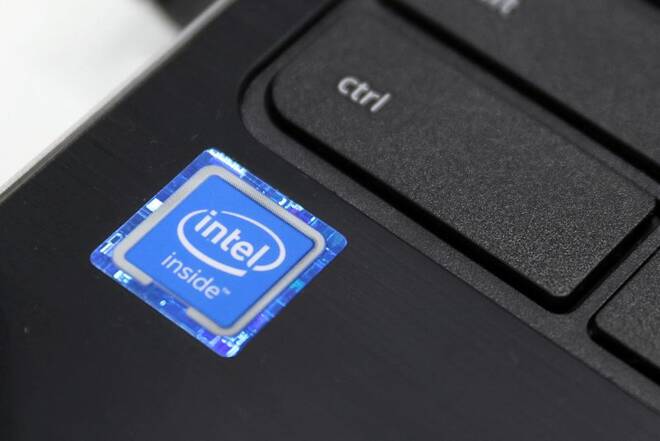Advertisement
Advertisement
Intel apologises in China over Xinjiang supplier statement
By:
HONG KONG (Reuters) - U.S. chip maker Intel apologised on Thursday to Chinese customers, partners and the public for telling its suppliers not to source products or labour from the region of Xinjiang, following a backlash in China.
HONG KONG (Reuters) -U.S. chip maker Intel apologised in China on Thursday after its letter telling suppliers not to source products or labour from the Xinjiang region triggered a backlash, making it the latest western firm to be tripped up over rights issues in the country.
Intel recently published what it described as an annual letter to suppliers, dated December, that it had been “required to ensure that its supply chain does not use any labour or source goods or services from the Xinjiang region”, following restrictions imposed by “multiple governments”.
The United States has accused China of widespread human rights abuses in Xinjiang, home to the country’s predominantly Muslim Uyghurs, including forced labour. Beijing has repeatedly denied the claims.
Intel’s letter, on the company’s website and in several languages, sparked criticism in China from state and social media, with calls for a boycott.
In a Chinese-language statement on Thursday on its official WeChat and Weibo accounts, Intel said that its commitment to avoid supply chains from Xinjiang was an expression of compliance with U.S. law, rather than a statement of its position on the issue.
“We apologise for the trouble caused to our respected Chinese customers, partners and the public. Intel is committed to becoming a trusted technology partner and accelerating joint development with China,” Intel said.
Intel did not immediately respond to Reuters’ requests for comment.
Other big multinationals have come under pressure over their aims to comply with sanctions related to Xinjiang while continuing to operate in China, a massive market and supply base.
On China’s Twitter-like Weibo, singer Karry Wang said he would no longer serve as brand ambassador for Intel, adding in a statement that “national interests exceed everything”.
Many Weibo users derided Intel’s apology as an attempt at protecting sales in China, with one saying “a mistake is a mistake! Retract the statement about Xinjiang!”
The hashtag “Is Intel’s apology sincere?” was trending on Weibo on Thursday afternoon.
Intel, which has 10,000 employees in China, said in its apology that it “respected the sensitivity of the issue in China.”
China’s foreign ministry said “accusations of forced labour in Xinjiang are lies concocted by anti-China American forces” aimed at destabilising China and hindering its development.
“We note the statement and hope the relevant company will respect facts and tell right from wrong,” foreign ministry spokesman Zhao Lijian told a daily briefing in Beijing.
Intel’s China presence includes assembly and test sites in Shanghai and Chengdu.
In July, Swedish fashion retailer H&M reported a 23% hit in local currency sales in China for its March-May quarter after it expressed concerns about human rights in Xinjiang.
(Reporting by Eduardo Baptista; Additional reporting by Yew Lun Tian in Beijing; Editing by Christian Schmollinger, Gerry Doyle, Tony Munroe and Jane Merriman)
About the Author
Reuterscontributor
Reuters, the news and media division of Thomson Reuters, is the world’s largest international multimedia news provider reaching more than one billion people every day. Reuters provides trusted business, financial, national, and international news to professionals via Thomson Reuters desktops, the world's media organizations, and directly to consumers at Reuters.com and via Reuters TV. Learn more about Thomson Reuters products:
Advertisement
